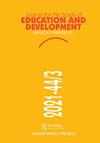A digital generation in scrutiny. Children’s ideas about the internet and the online information (Explorando una generación digital. Las ideas de los niños sobre internet y la información online)
IF 1.8
4区 教育学
Q4 PSYCHOLOGY, DEVELOPMENTAL
Journal for the Study of Education and Development
Pub Date : 2022-09-05
DOI:10.1080/02103702.2022.2096294
引用次数: 0
Abstract
ABSTRACT The internet has become a key environment for children’s learning and leisure at an increasing early age. Yet, little is known about what children understand about the internet. We conducted semi-structured interviews with 111 children aged five to nine to assess their notions about the internet, the authorship of online content and the trustworthiness they attribute to it. Considering the socio-cognitive advances throughout these ages, we expected a significant improvement in children’s concept of the internet. However, the results showed modest age differences, and only in some basic notions (e.g., internet functions). Misconceptions about the internet and naïve ideas about the reliability of its content were present at all ages. Only a very few older children envisaged the risk of finding malicious information online and the need to consult other sources in case of doubt. We discuss the necessity to address children’s misconceptions at least from the beginning of primary school, when most of them are cognitively ready to understand many of the issues addressed in this study, provided they receive guided instruction.他的父亲是一名律师,母亲是一名律师。儿童对互联网和在线信息的看法(探索数字一代)。孩子们对互联网和在线信息的看法)
互联网已经越来越早地成为儿童学习和休闲的重要环境。然而,关于孩子们对互联网的理解却知之甚少。我们对111名5至9岁的儿童进行了半结构化访谈,以评估他们对互联网的看法、在线内容的作者身份以及他们认为网络的可信度。考虑到这些年龄段的社会认知进步,我们预计儿童对互联网的概念会有显著改善。然而,结果显示出适度的年龄差异,并且仅在一些基本概念(例如互联网功能)上。对互联网的误解和naïve对其内容可靠性的看法在各个年龄段都存在。只有极少数年龄较大的儿童设想到在网上发现恶意信息的风险,以及在有疑问时需要咨询其他来源。我们讨论了解决儿童误解的必要性,至少从小学开始,当他们中的大多数人在认知上准备好理解本研究中提到的许多问题时,只要他们接受指导指导。
本文章由计算机程序翻译,如有差异,请以英文原文为准。
求助全文
约1分钟内获得全文
求助全文

 求助内容:
求助内容: 应助结果提醒方式:
应助结果提醒方式:


